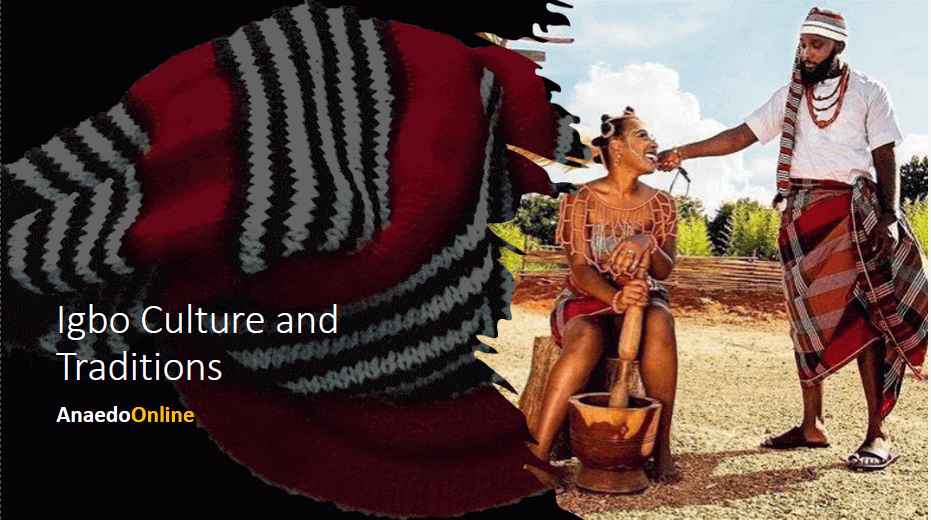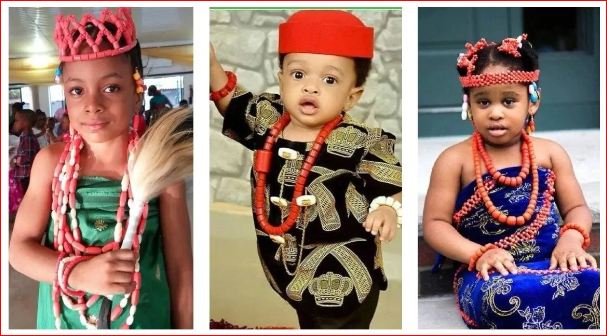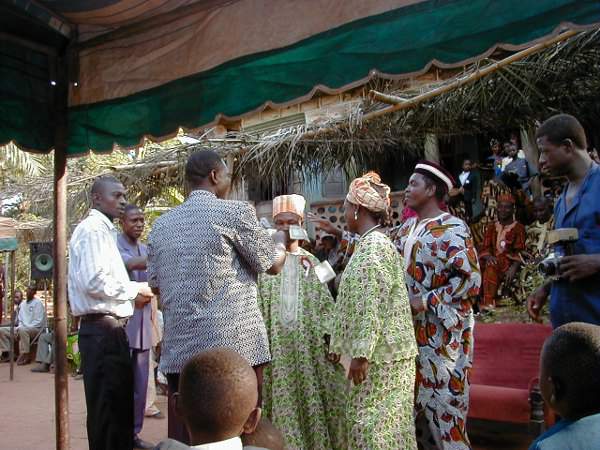The Rich Diversity of Igbo Culture and Tradition: The Igbo people, known for their rich heritage and unique customs, encompass a blend of archaic practices that have shaped their way of life. From the ancient beliefs and rituals encompassed in “Ọmenala ndị Igbo” to the intricate layers of tradition known as “Odinani,” every aspect of Igbo culture tells a story of resilience, community, and creativity.
In our journey through the bindings of Igbo culture and tradition, we’ll delve into the fascinating interplay between culture and tradition. At the heart of it all lies a common thread that unites all Igbo communities, creating a strong sense of identity. Yet, within this unity, lies a diversity of practices and customs that vary from one community to another, adding richness and depth to the cultural landscape.
Religion is significant in Igbo culture, with ancient beliefs and practices passed down through generations. Despite the prevalence of Christianity among modern Igbo people, the ancient reverence for Chineke, the supreme God, remains deeply ingrained in their mythology and worldview.
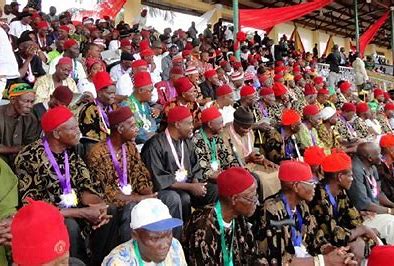
Igbo men adorned in traditional attire seated together in unity, showcasing Igbo culture.
Language, too, plays a vital role in preserving Igbo heritage. Upholding the language strengthens the bond within the community and ensures the transmission of traditions and values across generations.
Communal gatherings and festivities are integral to Igbo culture, providing opportunities for socializing and strengthening bonds. Colorful festivals, such as the New Yam Festival, serve as vibrant expressions of tradition and culture, bringing together families and communities in celebration.
From their traditional attire adorned with intricate patterns to the enchanting performances of Igbo masquerades, every aspect of Igbo culture showcases their artistic prowess and creative expression. It’s a delicate balance between the overarching umbrella of culture and the nuanced expressions of tradition that define the captivating and diverse landscape of Igbo cultural heritage.
Join us as we dig deeper into the rich varieties of Igbo culture and tradition, uncovering the stories, rituals, and customs that have shaped the lives of the Igbo people for generations.
Igbo Traditional Religion and Beliefs:
-
Traditional Religious Practices: (Odinani)
Odinani, the traditional religious practice of the Igbo people, forms the spiritual backbone of their culture. This holistic belief system encompasses various Igbo deities, spirits, and ancestors, emphasizing the interconnectedness of all aspects of life. Through rituals, prayers, and sacrifices, the Igbo seek harmony with the natural and supernatural realms, ensuring the well-being of individuals and communities.
-
The Supreme Deity and Ancestor Worship: Chukwu and Ancestors
Central to Igbo beliefs is the concept of a supreme deity known as Chukwu. Chukwu is seen as the ultimate creator and sustainer of the universe. The Igbo also place great importance on their ancestors, believing that they continue to influence and guide the living. Ancestor worship involves respectful veneration, seeking their blessings and intercession in daily life, and honoring their memory through rituals and ceremonies.
-
Divination, Sacrifices, and Religious Ceremonies: Connecting with the Spiritual Realm
Divination plays a crucial role in Igbo spirituality, as it enables communication with the spirit realm and provides guidance on important matters. Diviners, known as ”Dibia” or Priests, interpret signs and symbols to offer insights and solutions. Sacrifices are another essential aspect of Igbo religious practices, serving as offerings to appease or commune with deities and ancestors. Religious ceremonies, such as the New Yam Festival (Iri Ji) and the masquerade festivals, bring the community together to celebrate, give thanks, and seek blessings from the spiritual realm.
The influence of culture and traditions extends beyond religious beliefs and permeates various facets of Igbo heritage. It shapes their worldview, moral values, and societal norms. The Igbo people hold a deep respect for their ancestral heritage and often seek guidance from their ancestors through rituals and ceremonies. Ancestors are considered an integral part of the Igbo community, and their spirits are believed to provide protection, wisdom, and blessings to their living descendants.
Social interactions in Igbo culture exhibit a strong sense of tradition. Respect for elders and adherence to hierarchical structures are highly valued, with age and social status playing significant roles in interpersonal relationships. Traditional greetings and respectful gestures are essential in establishing and maintaining harmonious connections within the community. These customs reflect the importance placed on communal harmony and unity among the Igbo people.
In understanding Odinani (the indigenous religious practices of the Igbo people), the belief in a supreme deity (Chineke) and ancestor worship, as well as the significance of divination, sacrifices, and religious ceremonies, gives insight into the depth and complexity of Igbo spirituality and social interactions. These practices not only shape their worldview but also serve as a way to connect with the divine, honor the past, and foster communal harmony.
Traditional Igbo Attire and Fashion
Traditionally, the Igbo attire was characterized by minimal clothing, primarily serving the purpose of modesty by concealing private parts. Animal skins, such as leopard fur, were historically worn by chiefs and titled men as a symbol of honor and prestige. Further on, The Igbo people developed vibrant and colorful traditional attire that reflects their rich cultural heritage. Igbo men often wear a kaftan shirt paired with trousers, while women wear a blouse and wrapper made from a variety of fabrics.
The Isiagu fabric is a popular choice for men’s clothing. It is a suede fabric patterned with Leopard/Lion heads. On the other hand, the George or Hollandis wrapper is a staple of women’s fashion. Both attire pieces hold significant cultural and social meaning, reflecting the wearer’s status, beliefs, and values. Complementing the Igbo traditional attire involves the thoughtful inclusion of various ornaments, such as the distinctive Okpu (cap/hat), the elegant Mkpo (walking staff), and the culturally significant beads. These elements not only enhance the overall aesthetic appeal of the attire but also carry symbolic and traditional significance within Igbo culture.
In recent years, Igbo fashion has evolved, combining traditional wear with modern styles. With increased exposure to Western fashion and the rising influence of popular culture, younger generations have begun to incorporate contemporary elements into their clothing, such as sewing tuxedos and suits with the Isiagu fabric. This new wave of Igbo fashion represents a fusion of old and new, serving as a symbol of the community’s adaptability and openness to change.
Igbo Festivals and Celebrations
The profound role of Igbo festivals as heralds of the rich tapestry of Igbo cultures and traditions cannot be undertoned. Igbo festivals, such as the New Yam Festival (Iwa Ji) and the Ofala Festival, serve as cultural beacons, illuminating the essence of Igbo Culture and Traditions. These celebrations are not mere events; they are sacred rituals intertwining spirituality, dance, music, and the enigmatic presence of masquerades. Through a nuanced exploration of these festivals, one unravels the intricate mystery that binds the Igbo people to their roots, providing a captivating insight into the vibrant cultural mosaic that defines the essence of the Igbo people.
-
New Yam Festival (Iwa Ji):
A Harvest Extravaganza; The New Yam Festival, known as ”Iwa Ji” in Igbo, stands as the pinnacle of agricultural celebrations. This festival marks the culmination of the harvest season and the commencement of a new planting cycle. Rituals leading up to the festival include cleansing ceremonies, symbolized by “ịmáchà àhụ̀ irì jí mmírí” – a spiritual body cleansing involving bathing with plants. On the festival day, the air is filled with vibrant dances, rhythmic music, and the captivating presence of masquerades. The breaking of the Kolanut initiates the festivities, followed by prayers and the sanctification of yams for a bountiful year ahead. -
Ofala Festival:
A Royal Spectacle; The Ofala Festival, a majestic celebration deeply rooted in Igbo traditions, particularly in Anambra state, unfolds as a grand spectacle. Ofala is an annual renewal ritual led by the traditional monarch, be it the king, Igwe, or Obi. The festival encompasses a week-long retreat called “Inye Ukwu na ulo,” dedicated to prayers, gratitude, sacrifices, and spiritual cleansing. The ceremonial highlights include the monarch’s grand procession, title conferment ceremonies, and the awe-inspiring presence of deities, masquerades, and totems paying homage. Ofala transcends mere festivity; it embodies the cultural and spiritual essence of Igbo culture and tradition.
The Significance of Igbo Culture and Tradition in Artistic Creations
Igbo culture and tradition encompass a wide range of artistic expressions, deeply rooted in mythology, spirituality, and community values. This can be observed through the various art forms, music, and crafts that highlight the rich heritage of the Igbo people.
-
Textile Arts:
One significant aspect of Igbo artistic expression is the Akwete cloth weaving tradition. Akwete cloth, originally known as “Akwa Mmiri” (Cloth of the water), is a special woven fabric created by Igbo women in the Akwete area near Aba in Abia State. This weaving tradition dates back to ancient times and represents the creativity and craftsmanship of Igbo women.
-
Blacksmithing:
19th-century Igbo blacksmiths in Awka
Blacksmithing holds great importance in Igbo culture, with the Awka people being particularly skilled artisans. They were known for their bronze carving expertise, crafting bronze screens, gateways, guns, and other items. Awka blacksmiths belonged to guilds led by master blacksmiths, who managed the workshops and settled disputes. The use of ivu aba, a private language developed by Awka Smiths, helped maintain a competitive edge.
-
Uli Art:
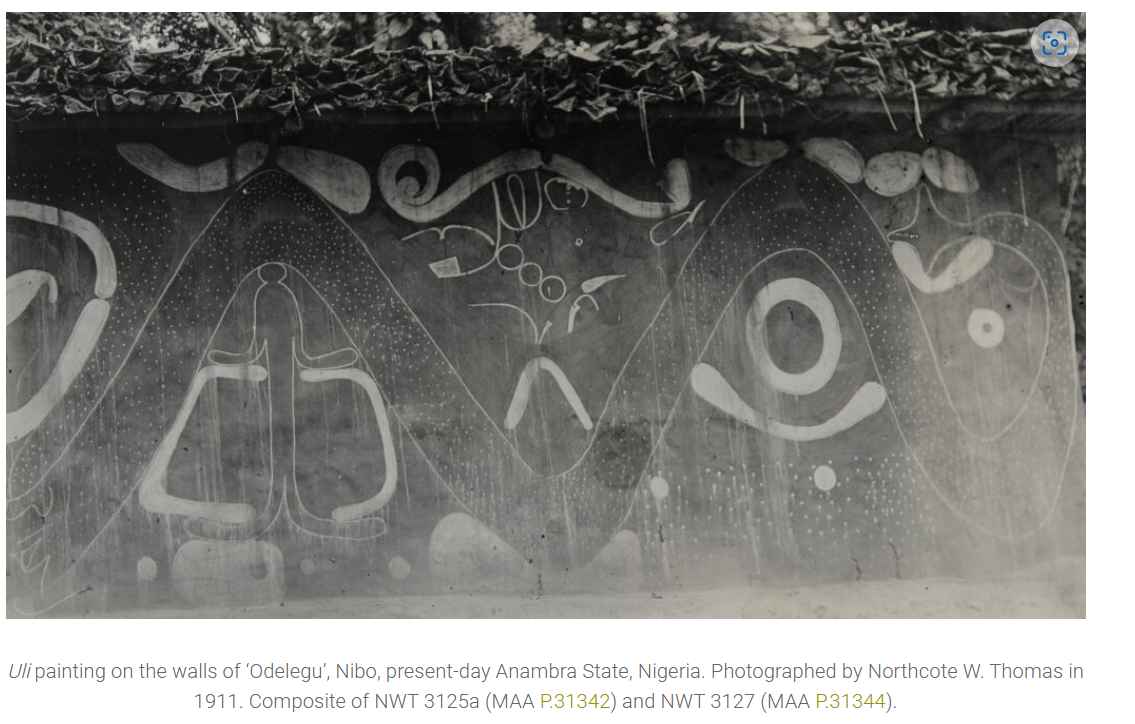
1911 Uli painting showcasing the richness of Igbo culture
Uli is a traditional art form practiced by Igbo women. This curvilinear design incorporates abstract linear forms, geometric shapes, and symbolic motifs. Uli designs are either stained onto the body or painted onto walls for ceremonial events or everyday wear. The name “uli” derives from the plants used to produce the dye. Although Uli has lost some popularity over time, it is still practiced by certain artists within Nigeria.
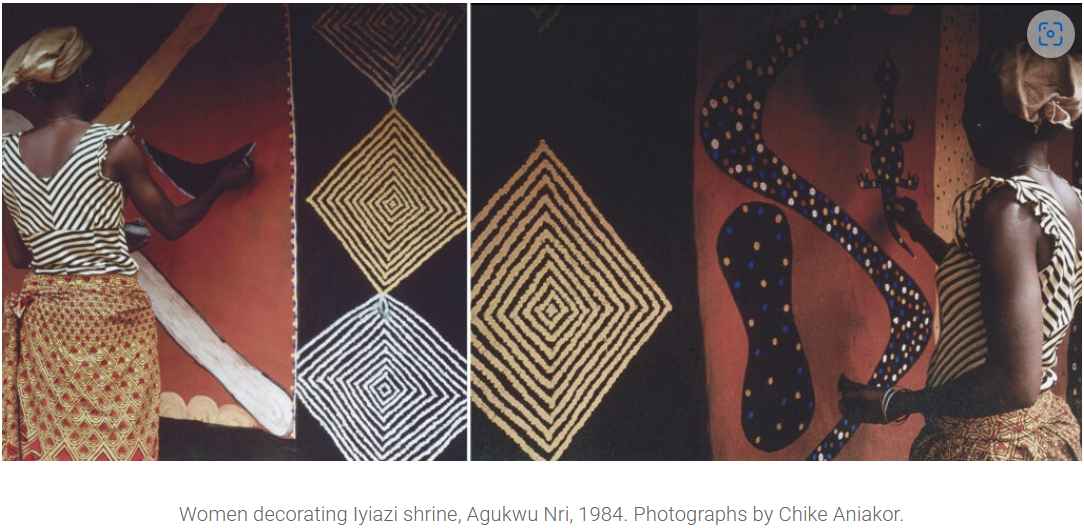
Iyiazi shrine, Agukwu Nri, Igbo land 1984
-
Igbo Music:
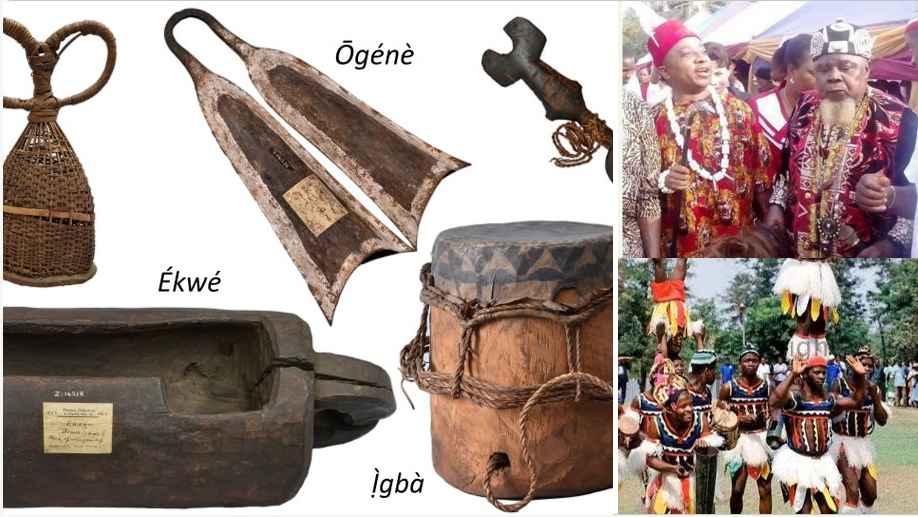
Igbo musical instruments, dance, and musician
Music is integral to Igbo culture, and percussion instruments such as drums (Igba) and gongs (Ogene) are key elements. Traditional Igbo music styles like Igbo folk music (Egwu-Ekpili) and Ogene music incorporate percussion instruments and flutes. The Udu pot drum, primarily played by women, produces bass sounds. Other instruments include Opi (similar to a flute), Igba, and Ichaka.
-
Igbo-Ukwu Bronzes:
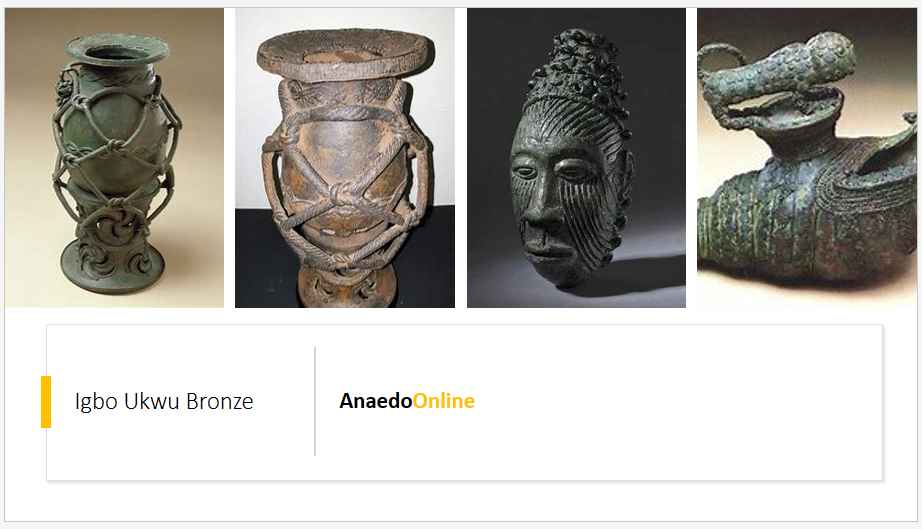
Igbo-Ukwu Bronze Artifacts
Igbo-Ukwu, an ancient town in southeastern Nigeria, is known for its archaeological discoveries that changed the understanding of West African art and trade. The bronze objects unearthed at Igbo-Ukwu demonstrate intricate designs, symbolism, and technical craftsmanship. These bronze artifacts, along with other art forms like traditional figures, masks, textiles, and works in metal, provide a rich record of Igbo visual art.
-
Pottery:
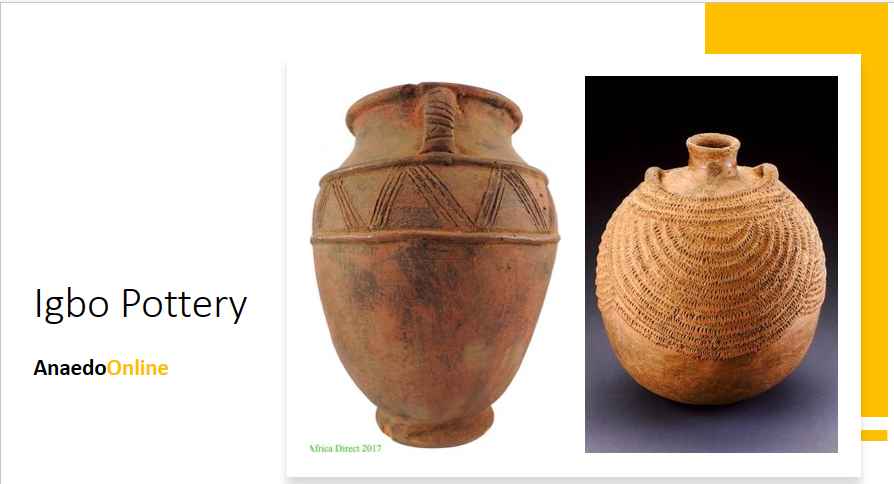
Igbo clay pots
Pottery-making is another essential cultural practice among the Igbo people, particularly renowned for the fine traditional pottery created by Igbo women. The pottery-making process involves specialized techniques such as coiling, scraping, and burnishing, passed down through generations. Growing up, the traditional clay pot was our source of cold water.
While there may be challenges in studying Igbo art due to the lack of centralization in Igbo governance, the diverse range of artistic expressions from textiles to blacksmithing, Uli art, music, bronze artifacts, and pottery showcase the depth and beauty of Igbo culture.
Igbo Cuisine and Traditional Foods:
Another aspect that portrays Igbo culture is her traditional foods. Igbo cuisine is a vibrant tapestry of flavors and textures, rooted in tradition and local ingredients. From ”ofe akwu” (palm stew) to flavorful onugbu and oha soups, the culinary landscape reflects the rich agricultural abundance of the Igbo people. Staples like cassava, yams, and plantains form the foundation of many dishes, while an array of spices and herbs elevate the taste to new heights.
Importance of Food in Igbo Culture
Food holds a sacred place in Igbo culture, extending beyond mere sustenance. It serves as a symbol of community, bringing families and friends together during special occasions and festivals. The act of sharing a meal is a profound expression of hospitality, fostering bonds and reinforcing the interconnectedness of the community.
Popular Igbo Dishes: Ofe Onugbu and Nkwobi
Among the plethora of Igbo dishes, Ofe Onugbu, or bitterleaf soup, stands out for its distinctive taste. Prepared with assorted meats and bitterleaf, it encapsulates the essence of Igbo culinary artistry. Another culinary delight is Nkwobi, featuring spicy cow feet served in a rich, flavorful sauce. These dishes not only satisfy the palate but also offer a glimpse into the cultural heritage and gastronomic prowess of the Igbo people.
Read Also: A Comprehensive Guide to All the Traditional Festivals in Igboland
Follow Us On Facebook
Post Disclaimer
The opinions, beliefs and viewpoints expressed by the author and forum participants on this website do not necessarily reflect the opinions, beliefs and viewpoints of Anaedo Online or official policies of the Anaedo Online.

